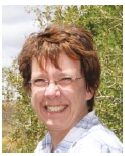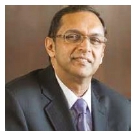Services on Demand
Article
Indicators
Related links
-
 Cited by Google
Cited by Google -
 Similars in Google
Similars in Google
Share
SAIEE Africa Research Journal
On-line version ISSN 1991-1696
Print version ISSN 0038-2221
SAIEE ARJ vol.112 n.4 Observatory, Johannesburg Dec. 2021
IEEE Xplore digital library indexes the Transactions of the SAIEE, 1909 to date
Saurabh SinhaI; Beatrys LacquetII; B.T.J. (Sunil) MaharajIII
IManaging Editor, SAIEE Africa Research Journal (incorporating the SAIEE Transactions) and Deputy Vice-Chancellor: Research and Internationalisation, University of Johannesburg, South Africa (email: ssinha@ieee.org)
IIEditor-in-Chief, SAIEE Africa Research Journal, Professor of Electrical Engineering & Acting Director: Wits Centre for Part-time Studies, University of the Witwatersrand, Johannesburg, South Africa (e-mail: beatrys.lacquet@wits.ac.za)
IIIThe current President of the SAIEE and Dean: Faculty of Engineering, Built Environment and Information Technology, University of Pretoria, South Africa (e-mail: sunil.maharai@uiac.za)
ABSTRACT
The SAIEE Africa Research Journal (incorporating the SAIEE Transactions) has been publishing peer-reviewed articles in electrical engineering and associated disciplines since 1909. Over the years, the journal has developed from capturing meeting proceedings to advancing the body of knowledge. Available editions of the scholarly journal of the SAIEE are indexed in IEEE Xplore. In Sept. 2021, this inclusion makes the SAIEE's scholarly journal the third oldest on the IEEE Xplore database.
Keywords: Index Terms-SAIEE Transactions, SAIEE Africa Research Journal, IEEE Xplore
I. Introduction
Like many international journals, the scholarly journal of the SAIEE moved to online access in 2005. At this time, the journal's name also changed to SAIEE Africa Research Journal (incorporating the SAIEE Transactions). The SAIEE website was the initial platform to access the journal and, with the name change, to also solicit further participation from the African continent.
The journal is accredited by the South African Department of Higher Education and Training (DHET), which means that public universities in South Africa receive publication subsidies for affiliated papers presenting recognised and original research outputs.
In the world of journals, however, there are different online platforms. These online platforms carry large audiences of authors who take an interest in a given discipline. In electrical engineering, the largest platform is the IEEE Xplore database. The Xplore database was launched in May 2000. Given IEEE's membership of over 400 000, in the inaugural year, 2000, there were already over 11 million downloads. With IEEE's history and its origins in 1884, at inception the database benefited from 350 000 author records and 553 000 documents; in 2019, the database exceeded over 3,8m author records, 5m documents with over 1.5 bn downloads and views since inception. Aside from their usage in academic settings, IEEE Xplore articles are also referenced in patents worldwide. Furthermore, to enhance the accessibility of articles, IEEE moved towards the model of hybrid and open-access (OA) journals. Because of these attributes, the SAIEE Africa Research Journal developed a collaborative partnership with IEEE Xplore.
Journal "performance" is often measured by the impact factor (IF). IF is a function of the number of citations over a period of time. Global reach, combined with the backing of a large audience, is helpful in extending reach; such reach often translates to a higher number of citations.
The collaborative discussions between the SAIEE and IEEE started in January 2012. Because quality assurance is of utmost importance, the IEEE carefully validates journals on the IEEE Xplore database; the SAIEE Africa Research Journal was considered over seven years to assess whether the peer-review process and quality were synonymous with the approach of the IEEE. To this end, the SAIEE Africa Research Journal diversified its editorial board, adopted tools such as an open-access journal management system, and introduced other approaches to strengthen peer-review quality and approach. In 2018, we received the news that the journal had been finally approved for indexing by IEEE Xplore.
Side-by-side with the journal review process, was another matter of importance - the cost of incorporating the journal into the IEEE Xplore database. Our interest was to have the journal captured from 1909. In addition to peer-reviewed articles, the complete SAIEE journey would be included in IEEE Xplore, which would constitute a historical archive. Each article would also be accompanied by a recognised digital object identifier (DOI). The cost of such an archive would ordinarily be prohibitive. IEEE approached the IEEE Foundation, Inc. to assist with this. Working together, resources were sourced from two IEEE held funds - International Electrical Congress Fund and Mailloux Fund - which had recently been repurposed with approval from the New York State Attorney General to augment the content of the IEEE digital library by supporting the hosting of one or more third party publishers content with preference to a non-U.S. publisher.
For the most recent editions of the SAIEE Africa Research Journal, the journal is supported through the following combination - IEEE, IEEE Africa Council and through article processing charges.
Through this convergence of support by SAIEE, IEEE, IEEE Foundation volunteers and staff, and the financial avenues, the SAIEE Africa Research Journal (incorporating the SAIEE Transactions) has now met a major international milestone; it now lists as one of the oldest electrical engineering journals globally. Journals in this league on IEEE Xplore now include:
• 1884 - Transactions of the AIEE
• 1905 - Proceedings of the AIEE (now IEEE Spectrum)
•1909 - SAIEE Africa Research Journal (incorporating the SAIEE Transactions)
The publication is indexed and availed (open access) here:
https://ieeexplore.ieee.org/browse/periodicals/title?refinements=Publisher:SAIEE
Specifically:
Since 2005, the SAIEE Africa Research Journal (incorporating the SAIEE Transactions) and
Since 1909, the Transactions of the South African Institute of Electrical Engineers.
Also acknowledging publication through the IEEE Xplore database, the journal is indexed by Scopus, SciELO SA, and Web of Science (Emerging Sources Citation Index). Through its listing on Scopus and SciELO SA, the journal remains on the accredited list of the DHET.

Saurabh Sinha, PhD(Eng), Pr Eng, FIEEE, FSAIEE, FSAAE, MASSAf, Prof Sinha obtained his B. Eng (with distinction), M. Eng (with distinction), and Ph.D. degrees in Electronic Engineering from the University of Pretoria (UP). As an established researcher, rated by the National Research Foundation (NRF), he has authored or co-authored over 130 publications in peer-reviewed journals and at international conferences. Prof Sinha served UP for over a decade; his last service being as Director of the Carl and Emily Fuchs Institute for Microelectronics, Department of Electrical, Electronic and Computer Engineering. On 1 October 2013, Prof Sinha was appointed as Executive Dean of the Faculty of Engineering and the Built Environment (FEBE) at the University of Johannesburg (UJ). As of 1 Dec. 2017, Prof Sinha is the UJ Deputy Vice-Chancellor: Research and Internationalisation. Among other leading roles, Prof Saurabh Sinha also served the IEEE as a Board of Director and IEEE Vice-President: Educational Activities.

Beatrys Lacquet graduated from the then RAU in 1988 with the Doctor Ingeneriae degree in Electrical and Electronic Engineering. She was appointed as professor in 1996 and served as the chairperson of the Department from 2000 to 2003. Dr Lacquet then joined the University of the Witwatersrand in 2003 as Professor of Electronics in the School of Electrical and Information Engineering. In 2007 she was appointed the Dean of the Faculty of Engineering and the Built Environment at Wits, and in 2013 she was appointed to the position of Deputy Vice-Chancellor with portfolio Knowledge and Information Management, Infrastructure and Operations. During the period July 2016 to January 2019, she led the Transnet Centre of Systems Engineering at Wits. Since February 2019 she has been appointed as the Director of the Wits Centre for Part-time Studies (Wits Plus) and of the Wits Language School. Prof Lacquet is a fellow South African Academy for Engineering, a fellow of the South African Institute of Electrical Engineering where she was the president in 2005, and a senior member of the IEEE. She is a registered professional engineer and serves ECSA in various capacities. She serves on numerous boards and committees.

B.T.J. (Sunil) Maharaj received his Ph.D. in Engineering in the area of wireless communications from the University ofPretoria. Dr. Maharaj is a Full Professor and Dean: Faculty of Engineering, Built Environment & IT and currently holds the research position of Sentech Chair in Broadband Wireless Multimedia Communications (BWMC) in the Department of Electrical, Electronic and Computer Engineering at the University of Pretoria. He is the current President of the SAIEE.














